CATEGORIES
Categorías
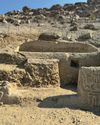
ORIGINS OF PERUVIAN RELIGION
While investigating looters' holes at the site of La Otra Banda in northern Peru's Zaña Valley, archaeologist Luis A. Muro Ynoñán of the Field Museum and the Pontifical Catholic University of Peru spotted carved blocks around seven feet below the surface.
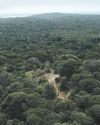
ISLAND OF FREEDOM
Many of the enslaved Africans sent to Brazil beginning in 1549 were from what is now Angola, where one of the most widely spoken languages was Kimbundu.
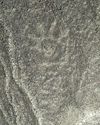
NAZCA GHOST GLYPHS
From the 1940s to the early 2000s, geoglyphs were discovered in the Nazca Desert of southern Peru depicting animals, humans, and other figures at the rate of 1.5 per year.

COLONIAL COMPANIONS
The ancestry of dogs in seventeenth-century Jamestown offers a window into social dynamics between Indigenous people and early colonists.

BAD MOON RISING
The British Museum houses around 130,000 clay tablets from ancient Mesopotamia written in cuneiform script between 3200 B.C. and the first century A.D.
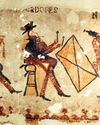
DANCING DAYS OF THE MAYA
In the mountains of Guatemala, murals depict elaborate performances combining Catholic and Indigenous traditions
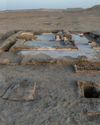
LOST GREEK TRAGEDIES REVIVED
How a scholar discovered passages from a great Athenian playwright on a discarded papyrus

Medieval England's Coveted Cargo
Archaeologists dive on a ship laden with marble bound for the kingdom's grandest cathedrals

Unearthing a Forgotten Roman Town
A stretch of Italian farmland concealed one of the small cities that powered the empire
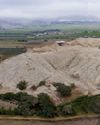
TOP 10 DISCOVERIES OF 2024
ARCHAEOLOGY magazine reveals the year's most exciting finds
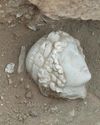
Digs & Discoveries - A Friend For Hercules - Archaeologists discovered a finely carved head depicting Apollo, god of the sun, music, and poetry.
While digging at the crossroads of the two main streets in the ancient city of Philippi in northern Greece, archaeologists discovered a finely carved head depicting Apollo, god of the sun, music, and poetry.
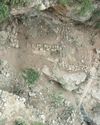
Digs & Discoveries - A Fortress Sanctuary - A sprawling 2,000-year-old fortress in the Zagros Mountains of Iraqi Kurdistan appears to have included a sanctuary dedicated to the ancient Persian water goddess Anahita.
A sprawling 2,000-year-old fortress in the Zagros Mountains of Iraqi Kurdistan appears to have included a sanctuary dedicated to the ancient Persian water goddess Anahita.
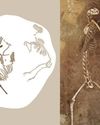
Like Cats And Dogs – Archeologist fund the skeleton of a male Eurasian lynx (Lynx lynx), a notoriously shy creature.
Оn the periphery of Zamárdi, an ancient lakeshore settlement in west-central Hungary, archaeologists uncovered a nearly five-foot-deep beehive-shaped pit with the skeletons of four adult dogs buried in successive shallow layers.
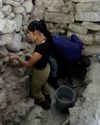
A Dynasty Born In Fire- How an upstart Maya king forged a new social order amid chaos
At the beginning of the Terminal Classic period (ca. A.D. 810-1000), many of the great kingdoms of the southern Maya lowlands-among them Tikal, Palenque, and Calakmul-were being abandoned or collapsing. For many years, scholars have assumed that most, if not all, the other kingdoms across the Maya world must have also been in steep decline.
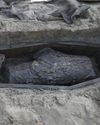
Medical Malfeasance - Archaeologists uncovered two coffins during excavations of a nineteenth-century cemetery in Quebec City that provide evidence of the illicit practice of diverting corpses for the study of human anatomy.
Archaeologists uncovered two coffins during excavations of a nineteenth-century cemetery in Quebec City that provide evidence of the illicit practice of diverting corpses for the study of human anatomy. Starting in 1847, medical students were required to have practical experience studying human anatomy, but legal options to procure cadavers were limited
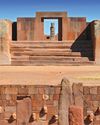
RISE AND FALL OF TIWANAKU
New dating techniques are unraveling the mystery of a sacred Andean city
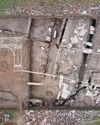
Making a Roman Emperor
A newly discovered monumental arch in Serbia reveals a family's rise to power in the late second century A.D.
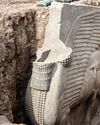
The Assyrian Renaissance
Archaeologists return to Nineveh in northern Iraq, one of the ancient world's grandest imperial capitals
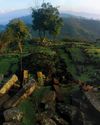
Java's Megalithic Mountain
Across the Indonesian archipelago, people raised immense stones to honor their ancestors
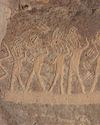
THE SONG IN THE STONE
Located in a desert gorge in southern Peru, Toro Muerto is one of the richest rock art sites in South America. It includes at least 2,600 boulders bearing petroglyphs, many featuring figures known as danzantes who appear to be dancing.
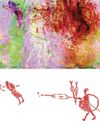
A Very Close Encounter
New research has shown that human figures painted in red on a rock art panel in central Montana depict individuals engaged in a life-or-death encounter during an especially fraught historical moment.

A Sword for the Ages
A zigzag pattern, now tinged with the green-blue patina of oxidized metal, adorns the octagonal hilt of a rare sword dating to the Middle Bronze Age in Germany (1600-1200 B.C.) that was recently excavated in the Bavarian town of Nördlingen.
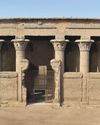
Ancient Egyptian Astrology
For centuries, layers of soot have coated the ceilings and columns in the entrance hall of Egypt's Temple of Esna. Now, an Egyptian-German team of researchers, led by Hisham El-Leithy of the Egyptian Ministry of Tourism and Antiquities and Christian Leitz of the University of Tübingen, is restoring the temple's vibrant painted reliefs to their original brilliance.
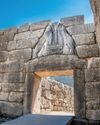
BRONZE AGE POWER PLAYERS
How Hittite kings forged diplomatic ties with a shadowy Greek city-state
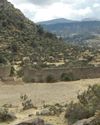
RITES OF REBELLION
Archaeologists unearth evidence of a 500-year-old resistance movement high in the Andes

Secrets of Egypt's Golden Boy
CT scans offer researchers a virtual look deep inside a mummy's coffin

When Lions Were King
Across the ancient world, people adopted the big cats as sacred symbols of power and protection

UKRAINE'S LOST CAPITAL
In 1708, Peter the Great destroyed Baturyn, a bastion of Cossack independence and culture

LAPAKAHI VILLAGE, HAWAII
Standing beside a cove on the northwest coast of the island of Hawaii, the fishing village of Lapakahi, which is surrounded by black lava stone walls, was once home to generations of fishers and farmers known throughout the archipelago for their mastery of la'au lapa'au, or the practice of traditional Hawaiian medicine. \"

A MORE COMFORTABLE RIDE
Although the date is much debated, most scholars believe people 5,000 years ago. For thousands of years after that, they did so without saddles. \"In comparison with horse riding, the development of saddles began relatively late, when riders began to care more about comfort and safety in addition to the horse's health,\" says University of Zurich archaeologist Patrick Wertmann.